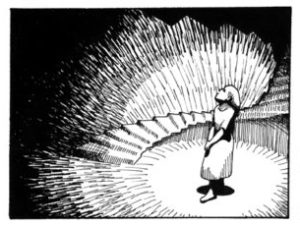This is not an update. I was thinking of something that happened weeks ago, and thought it deserved documentation.
It was shortly after the reconstruction. The endoprosthesis was installed in the shoulder, but the only thing holding it to my body was a bunch of very freshly stitched raw meat. The healed tissue and scars that were going to do the job later didn’t exist. The arrangement was very fragile.
The sling had to come off, temporarily – to adjust it, to clean off, to replace the soft fabrics around the arm that were keeping it from wearing holes in my elbow. Drains twisted over and under everything. I couldn’t let my arm be unsupported for even a moment. To complicate matters, the sling itself needed to be reshaped. The under-arm pillow was attached to the underside of the sling via a long piece of velcro. Unfortunately the fabric of the sling wasn’t attached straight, and the velcro was holding the wrinkles in place. The resulting ridges had begun to wear holes in my forearm.
So, lots of things needed to be done, and it was more than a mere three hands could accomplish, between Mark and myself. I decided it finally had to be dealt with when our friend Paige was over for dinner.
(In fairness, I waited until after dinner.)
But Paige was up for it. The more I think about it, the more I appreciate that she jumped right in. I was thinking about it from the point of view of the person who just had to get it done. There are moments in your life when you are beyond caring about what state you’re in, like when you’re giving birth. The last thing you’re worried about in the room full of strangers is that you have no clothes on.
So I was busy directing traffic. (Hold this here and don’t let it move. Hand me that washcloth.) I wasn’t remotely self-conscious about being shirtless and oozing bodily fluids (although see above for what a great sport Paige is).
And then Paige said to me, “You have such nice skin.”
…
…
When I was in graduate school with Mark in Buffalo, his mom got a rare liver cancer. They told us that only oriental men get this cancer, so they didn’t know what a white lady in Michigan City, IN was doing with it, but she only had a few months to live.
She lived three years. (So there.) They were a good three years for the most part. The last few months were hard. Mark and I put our studies on hold for a little bit and came out to be with her and Mark’s sister Jennifer, who was her full-time caretaker in the little ranch house they had both grown up in.
Toward the end, Ann stopped being able to speak. We knew she was still in there. There were small looks and gestures. She would tell us things and ask us things with her expression and we would answer her back and get what she needed. We weren’t sure how much clarity she had, but she knew she was surrounded by family and that we were doing everything we could to make her comfortable. For the most part she was very calm.
Until the one day we had a hospice worker there to check on her meds, undress her, and give her a sponge bath. This girl was young, less experienced than other people who had been there before.
I don’t know who started it, but they began fighting. Since Ann couldn’t speak, it took the form of a stubborn resistance when the girl tried to move her limbs to perform the bath. Maybe all she knew was that she was naked and some stranger was putting hands on her. The girl in turn would push harder, and eventually became rough, exasperated. Ann became more stubborn, brows furrowed with irritation, and, increasingly, fear.
I was watching this from the end of the bed. We didn’t want to leave Ann alone with strangers. So there I was. Guarding.
But how to stop this bizarre, nonverbal altercation? Do I yell at the hospice worker? It didn’t seem like a way to get her to perform her task with a little more empathy. Would I have to send her away? Do I tell the nonverbal cancer patient to relax and stop being so troublesome? As calm and proper a person as Ann was in life, she would still have figured out how to sign ‘Screw you’ with her eyebrows, I’m sure.
What I did, was stretch out my hand to Ann’s leg and stroke her ankle, gently. “Ann. You have such beautiful skin,” I said, appreciatively, breaking the tense silence.
Patient and caregiver froze, hostility suspended.
Then Ann relaxed into her bed and let the girl have her arm. The girl, for her part, resumed her ministrations, but this time her movements were more respectful and sympathetic.
I’m not sure why I did that, specifically. But it worked so much better than any lecture on ‘Hey now, we’re all just humans trying to get through this’ would have.
You have such nice skin.
A split second and twenty years later, I replied to Paige, “Thanks.”

Leave a Reply